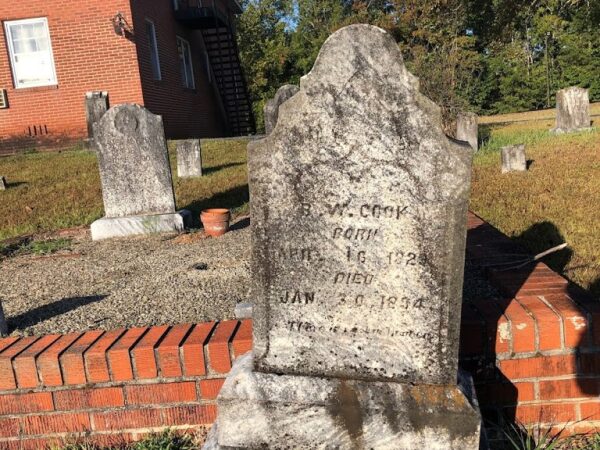 |
| Surrender of General Lee Library of Congress |
Upon their release, each rebel prisoner of war faced the decision of whether or not he would sign a document declaring his allegiance to the United States Government. Would he maintain his allegiance to a Southern government that had failed, or align himself with the government he had fought against?
Initially, I was surprised to find an Oath of Allegiance in Burton W. Cook’s Civil War file. While it would be easy to assume a change of heart, as I have read about the Oath of Allegiance, I have learned that many, if not most Southern Confederates signed simply because they wanted to return home.
Included among Burton W. Cook’s Civil War file is a paper which reads:
“Name appears as signature to an Oath of Allegiance to the United States, subscribed and sworn to at Elmira, N.Y., June 19, 1965.”
It further indicates that he had enlisted in Georgia 53rd, Company C, that he resided in Atlanta, Georgia and includes a physical description and was signed upon his release from the prison, Elmira in New York. From this paper, I learned that Burton had a florid complexion, dark hair, gray eyes and stood 6 foot tall. Because Burton appeared successful in his acquisition of land and goods, I had previously assumed that he had at least some education, but this paper seems to suggest otherwise. Burton signed “by mark,” implying that he could not write his name. Had it been difficult for him to sign a paper he could not read, presented to him by people he did not trust?
Although there is relatively little information on the form, for me it is a gem because it provides information found no where else about Burton W. Cook, married to Mary Ganus, my second great grandfather’s sister. It underscores the value of finding every source pertaining to each ancestor. From this document, I learned what Burton W. Cook looked like, where he lived, that he was among the many that were not educated, and that after years of war and imprisonment, he signed his allegiance to the United States Government. For the details it provides for me and for Burton’s descendants, I am so glad that he signed.
Copyright © Michelle G. Taggart 2014


I imagine signing a paper which would secure one's release from a prison might have some additional psychological pressures associated with it. Too bad that Civil War record did not include more details on his time in Elmira.
Just because he was unable to sign his name to the document did not necessarily indicate a lack of education. What he received–combined with his native ability, of course–was likely a different type of education, more suited to the business of personal success than academic accomplishment. Unless he inherited that land and possessions, Burton had to have been a savvy businessman to have acheived that level of success.
What a coincidence that I'm reading about that Oath here on your blog today. Just a couple hours ago I was reading about a distant ancestor whose Civil War record mentions in several places that he signed the Oath while a prisoner in Baltimore.
That is a coincidence Wendy! I hope you are able to find your ancestor's document and that it provides some fun details.
Civil War files can be so amazing and can give us such interesting information about our ancestors. Regarding Burton signing his name with an X, I'm not sure what to conclude from that. In the Civil War pension file for my 2nd great-grandfather, Iver Iverson, I have found that he signed his name as Iver Iverson and also signed his name with an X. He suffered from some health problems. Perhaps he had a difficult time writing at some point in his life. Perhaps your Burton suffered from some kind of injury or health problem that prevented him from being able to sign his own name.
They ARE so amazing! I often think how sad the wars were but how much we have because of them–irony.
That is super interesting about Iver Iverson. I've been in classes where we separated out individuals of the same name based one signing his name and another not—so I guess that just underscores the value of finding all the documents possible on our ancestors for the full picture. It does make me wonder though. I will have to go back through documents to see if Burton EVER signed a document. Interesting…
I agree Jacqi, it would be so nice to know more about his time there. I've read a lot about the prison as a whole and like prisons on both sides of the battle, it was pretty rough, but it would be nice to know more about Burton's specific experience. I really envy those who had ancestors who wrote home and whose letters have survived.
Michelle,
I want to let you know that your blog post is listed in today's Fab Finds post at http://janasgenealogyandfamilyhistory.blogspot.com/2014/08/follow-friday-fab-finds-for-august-1.html
Have a great weekend!
Thanks you Jana. It's an honor to be included in you Fab Finds!
Just found this post, perhaps he could write but if his jailors were assuming he and his fellow soldiers could not he may have been told to put his x mark. I am just imagining a line of soldiers queuing to sign to go home. Plus as it was a document he probably did not want to sign why should he bother to tell them I can write. A kind of defiance ?
Good point Haz….given the circumstances, those all may well have contributed to the "x" signature. Thanks for dropping by and commenting.